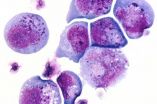(Press-News.org) As the number of children with food allergies in the U.S. increases, so does the risk of children having a severe, potentially life-threatening allergic reaction called anaphylaxis on school campuses. School nurses often have treatment plans in place for students with diagnosed allergies, but many children have their first allergic reactions at school, where a specific medication, such as EpiPen epinephrine injectors, may not be available and a response protocol may not be in place.
Students with identified food allergies are generally well known to school nurses. School nurses are uniquely prepared to develop and apply individualized health plans for students with allergies and to coordinate resources, training and allergy and anaphylaxis education, ensuring a safe school environment for all students.
"When I was the health services director for the Milwaukee Public Schools, the largest school district in Wisconsin, I witnessed nurses caring for children who had symptoms of anaphylaxis but no allergy diagnosis and for children with diagnoses whose parents hadn't supplied emergency medication to the school," said M. Kathleen Murphy, associate professor of nursing at the University of Texas Medical Branch at Galveston. "Because it was clear that the school nurses needed better preparation to provide a critical first response to these severe allergic reactions, I helped to develop and initiate an emergency response protocol that ensured nurses had access to stock epinephrine medications."
In 2009, Murphy began developing an emergency anaphylaxis response protocol in the Milwaukee Public Schools to allow school nurses to assess for anaphylaxis and administer epinephrine from the school's supply to children with unidentified allergies and known allergies for whom prescription epinephrine auto-injectors have not been provided to the school.
This project was implemented in two steps. First, a policy change was needed: the medical advisor issued standing orders that all school nurses who observe anaphylaxis in previously undiagnosed children treat them according to the new protocol. Other school personnel are trained to administer epinephrine only in situations in which a child has already been diagnosed, the anaphylaxis symptoms are documented and the child's prescribed auto-injector is at school.
Second, the new policy was put into effect. This required the purchase of epinephrine auto-injectors and the development of a staff training program. Before and after the school nurses attended the training program, a survey was given to gauge their knowledge of the signs and symptoms of anaphylaxis and their perceptions about the training. They received additional training and practice opportunities two months later, when the EpiPens were distributed to each school campus.
The pre- and post-training surveys helped to assess the nurses' knowledge, preparedness and attitudes about anaphylaxis and the response protocol. Comparison of the survey results showed improved awareness of anaphylaxis symptoms, greater confidence in their ability to respond effectively to an anaphylaxis emergency and more positive attitudes about the new response protocol.
The development of a protocol like this is a complex administrative process for school districts, according to Murphy, and the experience of the Milwaukee Public Schools in negotiating this process can serve as a model for others. Moreover, this protocol can also potentially be adapted for use by nonmedical personnel and used in other settings in which children may experience sudden, serious food allergies, such as child care and recreational facilities.
"Eventually, this protocol could be adapted to address the management of other conditions and even redesigned to allow for delegation to nonnursing staff," said Murphy. "This fairly simple protocol has the potential to make a significant difference in the lives of many people every day."
INFORMATION: END
UTMB professor implements lifesaving protocol for school children with severe allergies
2014-09-16
ELSE PRESS RELEASES FROM THIS DATE:
Healthy humans make nice homes for viruses
2014-09-16
The same viruses that make us sick can take up residence in and on the human body without provoking a sneeze, cough or other troublesome symptom, according to new research at Washington University School of Medicine in St. Louis.
On average, healthy individuals carry about five types of viruses on their bodies, the researchers report online in BioMed Central Biology. The study is the first comprehensive analysis to describe the diversity of viruses in healthy people.
The research was conducted as part of the Human Microbiome Project, a major initiative funded by the ...
Benefit of endocrine therapy in elderly women with low risk hormone receptor positive breast cancer?
2014-09-16
Treatment with endocrine therapy and radiation therapy as part of breast conservation is the current standard of care for women with hormone-receptor positive (HR+) invasive breast cancer. A new study by researchers at Fox Chase Cancer Center, however, shows that combination may not be necessary for all patient populations with the disease.
The results, which Fox Chase researchers presented at the American Society for Radiation Oncology's 56th Annual Meeting on Sunday, September 14, suggest that low-risk patients over 65 years old with small tumors may achieve comparable ...
Study identifies when and how much various prostate cancer treatments will impact urinary and sexual functioning
2014-09-16
Men with prostate cancer may one day be able to predict when and how much various treatments will impact their urinary and sexual functioning, thanks in part to new findings that researchers at Fox Chase Cancer Center presented at the American Society for Radiation Oncology's 56th Annual Meeting on Tuesday, September 16.
Looking over data gathered from more than 17,000 surveys completed by men diagnosed with prostate cancer, Fox Chase researchers tracked when patients' urinary and sexual symptoms changed following each type of treatment, and by how much. "The ultimate ...
World Health Organization policy improves use of medicines
2014-09-16
In this issue of PLOS Medicine, Kathleen Holloway from WHO and David Henry (University of Toronto, Canada) evaluated data on reported adherence to WHO essential medicines practices and measures of quality use of medicines from 56 low and middle income countries for 2002-2008. They compared the countries' government-reported implementation of 36 essential medicines policies with independent survey results for 10 validated indicators of quality use of medicines (QUM). They claim that the results provide the strongest evidence to date that WHO essential medicines policies ...
Access to female-controlled contraception needed in intimate partner violence
2014-09-16
Access to female-controlled contraceptive methods must be improved in order to help women and girls to counteract any risks to their reproductive health caused by intimate partner violence and reproductive coercion,* according to US experts writing in this week's PLOS Medicine.
Jay Silverman and Anita Raj from the University of California in San Diego explain that intimate partner violence is a major contributor to poor reproductive outcomes, such as unintended pregnancy, among women and girls around the world.
The authors argue that to improve reproductive health, ...
Meteorite that doomed dinosaurs remade forests
2014-09-16
The meteorite impact that spelled doom for the dinosaurs 66 million years ago decimated the evergreens among the flowering plants to a much greater extent than their deciduous peers, according to a study led by UA researchers. The results are published in the journal PLOS Biology.
Applying biomechanical formulas to a treasure trove of thousands of fossilized leaves of angiosperms — flowering plants excluding conifers — the team was able to reconstruct the ecology of a diverse plant community thriving during a 2.2 million-year period spanning the cataclysmic impact event, ...
A novel therapy for sepsis?
2014-09-16
This release is available in Japanese.
A University of Tokyo research group has discovered that pentatraxin 3 (PTX3), a protein that helps the innate immune system target invaders such as bacteria and viruses, can reduce mortality of mice suffering from sepsis. This discovery may lead to a therapy for sepsis, a major cause of death in developed countries that is fatal in one in four cases.
Professor Takao Hamakubo's group at the Department of Quantitative Biology and Medicine, Research Center for Advanced Science and Technology (RCAST), have shown that PTX3 forms ...
Meteorite that doomed the dinosaurs helped the forests bloom
2014-09-16
66 million years ago, a 10-km diameter chunk of rock hit the Yukatan peninsula near the site of the small town of Chicxulub with the force of 100 teratons of TNT. It left a crater more than 150 km across, and the resulting megatsunami, wildfires, global earthquakes and volcanism are widely accepted to have wiped out the dinosaurs and made way for the rise of the mammals. But what happened to the plants on which the dinosaurs fed?
A new study led by researchers from the University of Arizona reveals that the meteorite impact that spelled doom for the dinosaurs also decimated ...
The genetics of coping with HIV
2014-09-16
We respond to infections in two fundamental ways. One, which has been the subject of intensive research over the years, is "resistance," where the body attacks the invading pathogen and reduces its numbers. Another, which is much less well understood, is "tolerance," where the body tries to minimise the damage done by the pathogen. Now an elegant study using data from a large Swiss cohort of HIV-infected individuals gives us a tantalising glimpse into why some people cope with HIV better than others.
The authors find that tolerance varies substantially between individuals, ...
Point-of-care CD4 testing is economically feasible for HIV care in resource-limited areas
2014-09-16
A new point-of-care test to measure CD4 T-cells, the prime indicator of HIV disease progression, can expedite the process leading from HIV diagnosis to antiretroviral therapy (ART) and improve clinical outcomes. Now a study by Massachusetts General Hospital (MGH) investigators, working in collaboration with colleagues in Mozambique and South Africa, indicates that routine use of point-of-care CD4 testing at the time of HIV diagnosis could be cost effective in countries where health care and other resources are severely limited. Their analysis is being published in the ...



